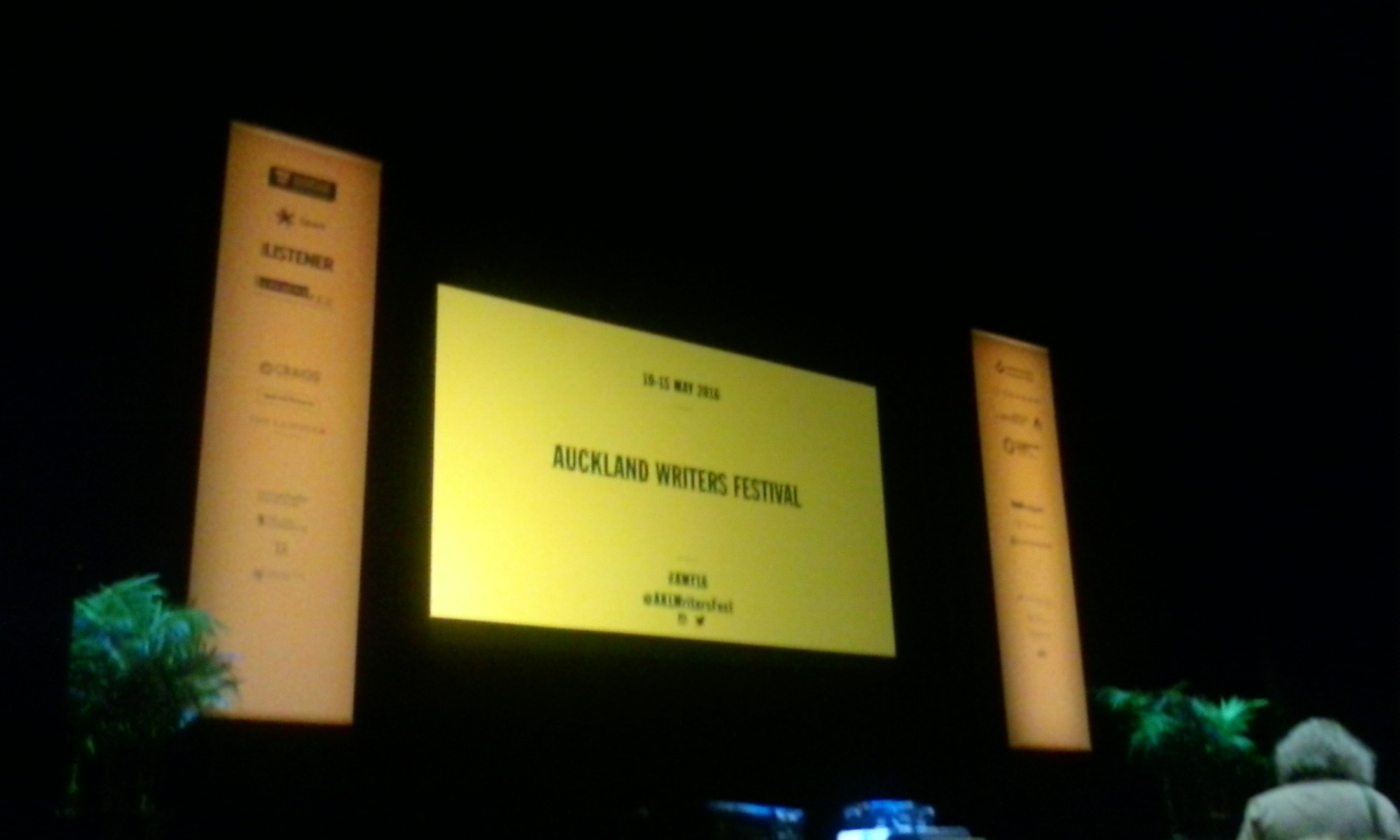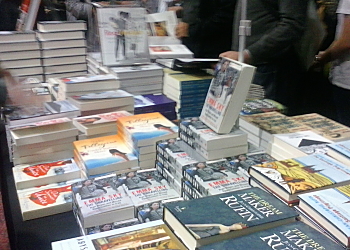Books, books, books. I could go on about them forever. They’re a great comfort to me; I love how I can forget everything else and be utterly absorbed by the world within their pages. I love the intimacy of the act of reading. I love how sometimes, when I finish a good book, I’m not quite the same person as I was when I started. (Hmmm… guess who’s majoring in English.) In case I haven’t been emphatic enough: I love books. Deeply.
I was therefore thrilled to get the chance to go to the Auckland Writers Festival. The story was, we bloggers were invited to pick any event in the festival we’d like to attend. In return for tickets to this event, we’d write about our experiences in our blog. I think I’m starting to like this blogging thing… I dropped everything and replied as soon as I saw the invitation. Somehow, the organisers managed to understand me through my breathless enthusiasm and I landed tickets. Whoopee!
The first tantalising part of this experience was actually choosing which event to go to. Everything sounded so interesting; we really were spoilt for choice. Some of the speakers included: women’s rights activist Gloria Steinem, Bill Oddie from cult comedy show The Goodies, and Hanya Yanagihara, the author of the bestselling novel A Little Life. I ended up deciding to see Marlon James, who won the prestigious Man Booker Prize last year with A Brief History of Seven Killings (clocking in at 700 pages it is far from brief).
I have to fess up: I never actually finished that book. It’s mostly set in Jamaica, and it describes the events before and after the attempted assassination of Bob Marley in 1976. I got through about 200 pages of the book and then put it down. The narrative was gripping, the characters were fascinating, the setting was powerfully evoked. It’s just that I couldn’t stomach the often ‘confronting’ subject matter of this epic novel. It was very graphic, and this was stopping me enjoying it as much as I would have otherwise. But this was my problem, not Marlon James’. His work was still an undeniably powerful piece of writing. Besides, from what I’d heard James seemed an interesting character, known for posting outspoken views on social media. And I hoped his talk would be relevant to my ENGLISH 112 paper where we’ve looked at several works of Caribbean literature. I was so dead-set on going to see James speak that I even sacrificed my usual Saturday morning sleep-in. That’s really saying something.
Come 10 AM on Saturday, the ASB Theatre was roughly two-thirds full; beforehand there had been snaking queues of people outside eager to snaffle up front-row seats. I seemed to be one of the youngest audience members, if not the youngest, but I’m so used to this from going to classical concerts that I didn’t really mind it as much as I probably should have. Noelle McCarthy, our host, introduced the man himself: Marlon James. Wearing a patterned bandana, purple suit and printed T-shirt, he certainly made for a visually striking figure. Over the next hour, he would have much to say about life, the universe, and everything.
James’ reasons for writing A History were fascinating. He described the novel as a way of exploring Jamaica’s ‘loss of innocence’ – the realisation in 1976 that ‘if [the gangs] could shoot Marley they could shoot anyone’. This was eye-opening for me: I was ignorant about Jamaican history or the importance of the assassination attempt in it. James also revealed that he was driven by a ‘fact finding mission’, a quest to excavate the 1976 that his parents knew. He was alive at the time, but being only six years old his 1976 was utterly different to the adult 1976. The thought that people, who inhabit the same spaces, who live in the same places at the same times, can have utterly divergent realities – this was a thought-provoking and poignant concept.
The speaker was unapologetic when it came to the explicit violence and sex of the novel. Humorously he claimed that he is actually ‘squeamish’ in real life, but needed to let go of his taboos when bringing the scarred characters of his novel to life. He encouraged readers to take a similar approach: to not allow discomfort to put you off from reading. At this point I started to look mildly shifty. ‘Discomfort is good’, said Marlon James, a healthy sign that readers are beginning to get inside the troubled minds of characters. James seemed to be implying that to understand terrible things is much better than to pretend they don’t exist. I agree with him there. All the same though, James’ analysis of Weeper, one of the more disturbed characters in his novel, chilled me to the bone. Weeper can never know emotional intimacy, and so the only form of closeness available to him is through extreme physical acts of connection. I’ll let you imagine the sordid details. Ugh. Even with all this justification, I’m still not sure I could stomach the sheer brutality of this novel.
On a more positive note I admired the sensitive but unabashed way in which James addressed issues of race. He spoke about the divide in Jamaican society of the 70s, how either you were a colonial sympathiser or a revolutionary determined to throw off the shackles of imperialism – there was no in-between. He explained how in recent years, Jamaica has moved beyond this restrictive framework and has become a more racially sophisticated society, able to mediate between the two sides. Alongside ‘regular’ American English, large sections of A Brief History are written in Jamaican patois (a modified form of English indigenous to Jamaica) . The writer described this choice as a way of resisting the idea that Jamaicans use a ‘broken English’. Jamaican patois, he asserted, was just as legitimate as American or British English; Jamaicans have taken the language and made it theirs. James certainly had a lot of guts to speak about these issues, especially in front of what was predominantly a white, ageing, middle-class audience. I think we all respected him for that.
Towards the ends of the talk, we were treated to a short passage from A Brief History of Seven Killings read by Marlon James itself. I can’t remember exactly what took place in the chosen passage – clearly I hadn’t got up to that point before I stopped reading – but I do remember that it was funny. Like, really, spine-tinglingly funny. I think in light of the graphicness of the novel I’d forgotten how frequently hilarious it was. And of course it was great to hear the author reading some of his own work. One thing’s for certain: I can’t do a Jamaican accent as well as Marlon James can. The last five minutes were question time. I was too nervous to ask any questions of my own, but the audience’s queries indicated an enthusiastic response: one person asked incredulously, ‘Are you really squeamish?’. The event was wrapped up to rapturous applause from the audience; I could hear whistling from somewhere down the back.
I thus left the theatre buzzing after a riveting and highly thought-provoking experience. On my way out, I was taunted by the stall of discounted paperbacks in the foyer, but sadly my budget wasn’t about to make any compromises. The joys of being a student, huh… I quickly realised I had a newfound respect for Marlon James. I think I might just pick A Brief History up again, although I’m not making any promises as to how far I’ll get this time round.
As I wrap up this humongous blogpost, I want to say a few words of thanks. To Catherine, and to everyone working behind-the-scenes at The Inside Word, thank you so much for making this experience possible. You’ve made a bookworm very happy, and exposed him to ideas that he’ll be mulling over for quite some time.
– Anthony.

